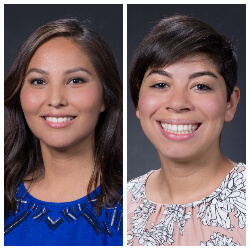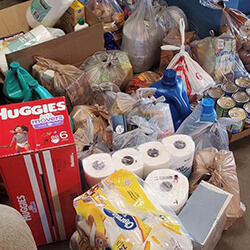Medical Students Bring Supplies to Rural Arizona
University of Arizona College of Medicine – Phoenix fourth-year medical students Lorna Rapaich and Krichelle White were inspired to lend a hand to the Navajo community of Hardrock, Arizona, during the COVID-19 pandemic.

“Sometimes the smaller communities are often forgotten about, or they are the last to receive any aid. This was very unsettling for me,” said Rapaich. “I wanted to find a way to lessen the burden for not only my family, but for other members of the Hardrock community.”
The Navajo Nation has been hit hard by COVID-19 due to the many vulnerabilities of the population, Rapaich explained. There is a higher proportion of individuals with underlying medical conditions that affect not only the elderly but also children and middle-aged adults. Some residents lack running water and refrigeration. Coupled with the fact that many households are multi-generational, it has been difficult to contain the spread of the virus.
Additionally, communities in rural Arizona have a limited number of grocery stores, which makes planning ahead and making minimal trips to the store almost impossible because many items are out of stock. Due to the distance to the nearest grocery store, making the trip can be financially draining as well.
The virus has forced the local boarding school to close and the school lunch program has ceased, leaving an increased need for more food at home. Rapaich said all those needs prompted her to organize the campaign.
She brought the idea to her friend and classmate Krichelle White, who initiated and organized a social media campaign to raise awareness and gather donations from classmates and members of the community.

All monetary donations were used to purchase food baskets for the elderly and families with school-aged children, which were assembled and delivered by a Hardrock general store.
White said the donations were well received. “They were happy to know that they were not forgotten,” she said.
After they collected the items, they worked with Germaine Simonson, who owns the Rocky Ridge Gas + Market, to assemble and distribute the food baskets. Those who distributed the goods wore personal protective equipment and had no contact with elders in the community.
“It truly was a matter of just helping out one another,” Rapaich said. “As students, we may not have a lot to give, but we have a little, and sometimes that is enough to make a big difference.”
About the College
Founded in 2007, the University of Arizona College of Medicine – Phoenix inspires and trains exemplary physicians, scientists and leaders to advance its core missions in education, research, clinical care and service to communities across Arizona. The college’s strength lies in our collaborations and partnerships with clinical affiliates, community organizations and industry sponsors. With our primary affiliate, Banner Health, we are recognized as the premier academic medical center in Phoenix. As an anchor institution of the Phoenix Bioscience Core, the college is home to signature research programs in neurosciences, cardiopulmonary diseases, immunology, informatics and metabolism. These focus areas uniquely position us to drive biomedical research and bolster economic development in the region.
As an urban institution with strong roots in rural and tribal health, the college has graduated more than 1,000 physicians and matriculates 130 students each year. Greater than 60% of matriculating students are from Arizona and many continue training at our GME sponsored residency programs, ultimately pursuing local academic and community-based opportunities. While our traditional four-year program continues to thrive, we will launch our recently approved accelerated three-year medical student curriculum with exclusive focus on primary care. This program is designed to further enhance workforce retention needs across Arizona.
The college has embarked on our strategic plan for 2025 to 2030. Learn more.